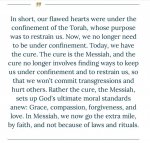https://www.oneforisrael.org/bible-...he-torah-from-a-messianic-jewish-perspective/
Cut from above "not reinventing the wheel" Give credit to above website
UNDERSTANDING THE CONTEXT
The children of Israel were most definitely not an innocent people – rather these commandments were given to a people who had been slaves, a people who went through oppression and physical and mental abuse, a people lacking in education, influenced greatly by pagan, barbaric, and twisted cultures – cultures which were mostly extremely wicked and cruel. That’s why the children of Israel had extremely low morals and principles. You could almost say that they were a bunch of hooligans. Also, their way of thinking and their way of interacting with their surroundings was morally speaking like that of a small and undisciplined child, and their behavior and the way they treated one another was influenced accordingly. People such as these must indeed learn basic things – that murder is not a good thing, that you’re not supposed to have sexual intercourse with your mother, and not with your goat or sheep either, and when your mother and father ask you to do something that you really don’t want to do you don’t beat them up because they’re old and weak – rather you respect them and their request.
On the one hand, when you’re dealing with merciless barbarians, you need to handle them with a strong hand, and that’s why you find a lot of threats about death penalties. On the other hand, for the first time we’re introduced to God’s grace and compassion, for who has the patience to deal with such people? But God, while putting down firm and clear boundaries, also shows grace and compassion. How? By being merciful!
By the way, despite the fact that the standards in the Torah do not represent God’s ultimate standards, not one of us is able to uphold them perfectly, which shows us that we are incapable to save ourselves. We need someone to come and deliver us, a divine Messiah. There’s a direct correlation between “knowledge” and “morality”. When we “know” God, in other words when we know the character and the will of God, our moral principles and ethical standards go up accordingly. The Torah and its laws were only a first step, a first step out of a moral slough and towards godly morals....
...
JESUS CAME TO FULFIL THE MESSIANIC HOPE OF THE TORAH AND THE PROPHETS
In other words, the entire Old Testament, from the very beginning of the Torah to the very end of the Prophets, points to our need of the Messiah. Jesus did not come to abolish the Torah. In other words, Jesus didn’t come to make up a new story, but to fulfill the original story because, after all, the Torah’s prophecies are about him:
...
In conclusion, while the Torah is God’s word in every sense, we need to remember that we are no longer under the authority of the commandments of the Sinai Covenant. In the Sinai Covenant, we served God through the priesthood and through sacrifices in the temple.
The priests were the mediators between God and the people and the commandments of the Sinai Covenant were the laws that showed us how to serve God in the framework of this covenant. In the New Covenant, on the other hand, we are under the Torah of the Messiah. He is our great High Priest, who brought us a Torah with much higher and much more challenging standards in comparison with those of the Sinai Covenant.


